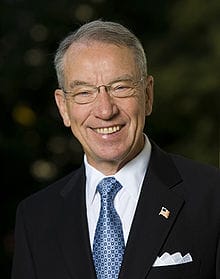With Republicans now in the majority in the U.S. Senate, they have new political muscle to flex and are hoping that oversight inquires once relegated to a black hole can finally yield responses.
That’s why the new chairman of the Senate Judiciary Committee, Sen. Charles Grassley, is renewing pressure for the Department of Justice to disclose its analyses of President Obama’s controversial executive actions.
In a letter to Attorney General Eric Holder this week, Grassley said that unilateral executive action threatens the Constitution’s separation of powers and circumvents Congress’s role to make the law.
[quote]“There’s absolutely no reason the Department of Justice can’t provide to the public its analyses of the President’s executive actions. The administration has proven this through selective release of some material,” Grassley said.[/quote]

Grassley first made his request for disclosure a year ago after the President stated, “I’ve got a pen and a phone.” But the Justice Department cited executive branch privilege in withholding the documents.
Grassley then followed with a request for the legal analysis about the release of five high-level Taliban detainees from Guantanamo Bay in exchange for Taliban-captured U.S. Army Sergeant Bowe Bergdahl without the congressional notification required by law. But again, the Justice Department denied the request.
In a hearing last month, Department of Homeland Security Secretary Jeh Johnson defended President Obama’s executive action on granting legalized work status to up to five million illegal immigrants as “simple common sense.”
Attorney General Eric Holder has strongly defended the Presidents executive actions on a variety of issues as lawful. A U.S. District Court Judge recently issued a legal opinion that parts of the President’s executive amnesty orders were unconstitutional. However, the Justice Department stated, “The decision is unfounded and the court had no basis to issue such an order.”
President Obama has defended his executive orders stating: “Congress has a responsibility to deal with these issues and there are some things that I can’t do on my own.”
Read the White House released list of Executive Orders
Grassley says the Justice Department should be willing to share the bases for its conclusions.
“My requests for transparency have been denied by the self-proclaimed ‘most transparent administration in history.’ Yet, they seem to release the same types of documents when it suits their own wishes,” Grassley said. “Being transparent doesn’t mean releasing information only when it’s beneficial to the outcome you desire. Transparency means disclosing both the good and the bad.”
Read the Washington Post analysis of Executive Action on Immigration
Read The Hill article on key Obama Executive Actions
Read Grassley letter below:
January 8, 2015
Via Electronic Transmission
The Honorable Eric H. Holder, Jr.
Attorney General
U.S. Department of Justice
950 Pennsylvania Ave., NW
Washington, DC 20530
Dear Attorney General Holder,
I write today to renew my January 2014 request that the Department of Justice publicly disclose the advice it has provided regarding the constitutionality and lawfulness of executive actions proposed by President Obama. Respectfully, the Department’s responses to my request and my follow-up inquiry are inadequate to date.
Unfortunately, the President’s resort to unilateral executive action is threatening the Constitution’s separation of powers by circumventing Congress’s role to make the law. At the very minimum, his use of these actions has brought their constitutionality to the forefront of our political debate. Yet in almost every instance, the public remains without important information that could inform that debate – the Office of Legal Counsel (OLC) analysis of these actions.
As you know, I have engaged the Department on this issue since the President signaled his intention to implement his agenda through aggressive use of executive action in his 2014 State of the Union address. On January 31, 2014, I wrote to you to request that the Department publicly disclose the opinions, analyses, and conclusions that the OLC provides about these actions.
Over four months later, in a letter dated May 20, the Department declined my request, citing both attorney-client and executive privileges. However, the letter invited me to follow up with questions regarding particular executive actions.
A few weeks later, I took the Department up on its offer concerning a particular executive action that was highly troubling, both as a matter of law and policy. In early June, the President released five Taliban detainees held at Guantanamo Bay in exchange for U.S. Army Sergeant Bowe Bergdahl. The detainees were reportedly senior-level Taliban commanders with direct links to al-Qaeda. They were also reportedly determined to be of high risk to the United States and were recommended for continued detention.
However, the Administration did so without complying with the National Defense Authorization Act of 2014 (NDAA), which required that 30 days before the transfer of any detainee from Guantanamo Bay, it notify and provide Congress with important information justifying the transfer. As you know, the non-partisan Government Accountability Office (GAO) subsequently concluded that the Administration acted illegally when it did not provide this notice to Congress. Moreover, substantial questions remain about whether the transfer of these detainees was sound national security policy.
Therefore, in a letter to you dated June 5, I requested that you make public the OLC’s opinions, analyses and conclusions related to this specific executive action. I did so in part because Administration officials testified that the Department provided written legal advice in advance of these controversial transfers, and because the Administration’s factual justification for failing to comply with the law appeared to shift in the days and weeks following their announcement.
In a letter dated December 9, the Department declined my follow-up request. The letter broadly asserted that the “Executive Branch has substantial confidentiality interests in legal advice provided by the Department” and that “such advice is generally not disclosed.” Instead, the letter enclosed a portion of an after-the-fact rationalization for the action that the Department of Defense provided to the GAO in response to its inquiry into the matter.
Respectfully, the Department’s most recent response does not address my concerns or resolve my requests. In my original letter, I wrote that part of my intent was to shed light on whether controversial executive actions “are being subjected to a rigorous constitutional review at the Department.” For this and other reasons, I requested that OLC analyses be made public “contemporaneously” with the undertaking of the executive action itself. The post hoc justification the Department of Defense provided to the GAO does not allow Congress or the American people to know whether the OLC is fulfilling its duty to provide unbiased, thorough advice to Administration officials before decisions are made, and whether officials are being candid with the OLC about the relevant facts on which its advice is based. The Judiciary Committee must be able to fulfill its oversight responsibilities in this regard.
Therefore, I again request that you publicly disclose any ex ante legal advice – whether in a memorandum or less formal format – that the Department provided in advance of the President’s decision to transfer the five senior Taliban leaders from Guantanamo Bay without notifying Congress. I also renew my request for public disclosure of any similar Department or OLC opinions, analyses, conclusions or other advice documents related to the President’s other uses of executive action since January 2014.
Finally, I note that the Department’s refusal to disclose the OLC’s advice related to these detainee transfers is particularly inexplicable after the Administration recently publicly disclosed lengthy legal memoranda purportedly justifying the President’s highly contentious executive action on immigration. The Administration’s use of selective transparency only serves to sow doubt about whether the Department rendered sound advice regarding these transfers.
Sincerely,
[Sen. Charles Grassley]



